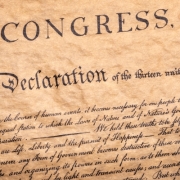The Integration of America’s Revolutionary Mind and Body Includes Liberty, Justice, Truth, and Freedom.
The first chapter of Brad Thompson’s 2019 book, America’s Revolutionary Mind is titled The Enlightenment and the Declaration of Independence. In it, the radical 17th century achievements of John Locke are featured. Then his principles, put into action by 18th century American political philosophers led by John Adams, are explicated. The second chapter begins the logical reduction down the conceptual ladder toward axiomatic truth, and is titled The Laws of Nature.
Here, Thompson draws distinctions among natural law and the moral laws of nature, and then describes how America’s Founders formed basic propositions about them: self-preservation and reciprocity for the rights of others. While the consequences regarding the laws of nature meant individual survival, the rewards and punishments for violating the law of reciprocity were social admiration or contempt.
Yet moral recognition for what is good, particularly the productive virtues measured as profit, is woefully lacking in America today. In its place, mediocrity is celebrated. The 2020 presidential election outcome being its latest crowning glory.
As important as natural law and the moral laws of nature are to peaceful human progress, our Founders knew they do not carry the weight of statutory law. They do not protect individuals from force applied by others, which is the only threat to acting on one’s rational self-interest. Because of this, only objective statutory law was worthy of America’s Founders pledging their “lives, fortunes and sacred honor.”
More specifically, they demanded law rooted in the axiomatic and discoverable truths of life itself – Self-Evident Truths, and the title of the third chapter. Quite fittingly, Thompson begins it by quoting Thomas Jefferson, and his 1824 letter to John Cartwright, an English Whig,
Rather than “musty records, royal parchments, or laws of institutions of a semi-barbarous ancestry,” Americans appealed to “an album on which we were free to write.” Americans did not claim “the inspiration of heaven, but the use of reason and the senses.”
According to John Taylor of Caroline, America’s Founders established government “rooted in moral or intellectual principles, not orders, clans, or castes.” For evidence of this, Continental Army Chaplain Enos Hitchcock wrote, “Justly it may be said, the present is an age of philosophy, and America the empire of reason.”
It is no wonder, that in our postmodern era, philosophy and reason are sacrificed for the pragmatic whims of political power in the name of social justice. Thinking is hard.
The essence of this chapter lies in the four moral and political truths of the Declaration, the ones marvelously titled, “We hold these truths to be self-evident.” Thompson’s explanation of basic self-evidence that follows, and its less obvious forms, would be an appropriate test of anyone’s claim for being a thinking American.
Of course, the first one states “that all men are created equal,” yet are we? No two individuals (other than identical twins) are born with the same physical strength, esthetics, cognitive skills, and family resources. In fact, this kind of inequality is the natural state of human existence. Accordingly, it is the subject matter for Chapter 4 titled Equality, and the meaning and acceptance of the concept of “truth” must come first.
According to Locke’s Essay Concerning Human Understanding, truth is revealed “when these signs are joined as our ideas agree; and when our ideas are such as we know are capable of having an existence in nature.” For America’s Revolutionary Minds,
There is a necessary connection between truth and freedom of the mind. The freedom to think is both an aspect and requirement of human flourishing. Because truth is not innate, the human mind must be free to discover the truth.
The corollaries to this are themselves revolutionary. Truth and freedom, liberty and justice, self-ownership and property rights, the laws of nature and moral law – and in fact, the human mind and body, are all integrated and co-dependent units. The latter being sovereign is proven by the former. In Federalist 31, Alexander Hamilton explains there “certain primary truths or first principles upon which all subsequent reasonings must depend.” After citing the natural law of geometry as an example, Hamilton explains that in ethics and politics,
There cannot be an effect without a cause; the means ought to be proportioned to the end; every power ought to be commensurate with its object. A government ought to contain in itself every power requisite to the full accomplishment of the objects committed to its care.
This is where Thompson explains the self-evident nature of the third and fourth assertions of truth in the Declaration – governments are instituted to secure rights, and if they fail, governments may be altered or abolished. These “are contingent and necessary based on the deductions from the self-evident axiom” (all men are created equal) “and the moral first principle” (all men are endowed with certain unalienable rights). ”
They were not self-evident to the Declaration’s statesmen as a form of intuitive knowledge or by virtue of the meaning and relations of the terms themselves. It was only over time that the Declaration’s truths became self-evident to the leaders of the revolutionary movement.
Thompson found the power of the Declaration’s meaning in the phrase, “We hold these truths to be self-evident.” The emphasis on “hold” is because “they were grasped and acquired over a period of time, i.e. in the course of human events, the American people discovered and came to accept these truths over the course of many years.”
Undoubtedly, this is what John Adams was writing about in his comment that the true revolution “was in the minds of the people, and this was affected in the course of fifteen years before a drop of blood was shed at Lexington.” Oddly enough, this is how long it takes for government progressive education to convert young and talented lovers of life into selfless declarers of lives that matter, except their own it seems. Thompson well summarizes Adams and his contemporaries, and today’s intellectual bankruptcy, when he writes,
At the very least, Americans should study the history of liberty, the nature of that power, the cruelty that drove their ancestors from their homes in England, and the views and ends in exchanging their native country for a dreary, inhospitable wilderness.
For readers of this article, it may start with becoming an active participant in the Waking America’s Revolutionary Mind study group.






